Exploring your family history has never been easier—or more affordable. With a wealth of free genealogy websites available, you can access millions of records, family trees, and historical documents without any subscription fees.
This guide highlights the top free sites for tracing your ancestry, offering powerful tools to help you uncover stories, preserve memories, and expand your family tree from the comfort of home.
Free Genealogy Sites
Trace your family tree for free online with these totally free genealogy websites:
- MyHeritage Free Trial – Search more than 20 billion historical records from all over the world, grow your family tree with sophisticated matching technologies, and enhance, colorize, repair, and animate old family photos with the world’s best AI photo features. Read our complete MyHeritage Review.
- Ancestry Free Trial – You can get access to all of Ancestry.com records for a 14-day free trial.
- FamilySearch – The largest free genealogy website in the world.
- National Archives – Federal military, census, immigration, land, naturalization records and more.
- Library of Congress – Access free digitized images of newspapers, books, films, maps, personal narratives, photos, prints, and drawings.
- Chronicling America – Part of the Library of Congress website, Chronicling America has searchable images of US newspapers from 1792-1963.
- Allen County Public Library – Located in Fort Wayne, Indiana, the Allen County Public Library has one of the largest genealogy collections in the United States.
- Ancestry Free Indexes – Want to do a free Ancestry search with no subscription? Ancestry.com has a number of free collections which include census records, immigration records, military records, prison records, wills, biographies, and a large number of Jewish records from eastern Europe. See our complete Ancestry.com review.
- Find A Grave – Over 170 million burial and cemetery records have been submitted to Find A Grave.
- Ellis Island – Through this website, you can explore the history of Ellis Island, get tips on genealogy research, and search the 65 million Ellis Island database entries for your immigrant ancestors.
- Castle Garden – Records for 11 million immigrants to New York from 1820-1892 can be searched online.
- USGenWeb – County and state resources, compiled and maintained by volunteers, the USGenWeb sites can provide historical information about places, local cemeteries, local birth, and death records, obituaries, and links to other genealogy resources related to the area and its people.
- Fulton History – A searchable repository of old newspapers published in the United States and Canada, Fulton History has historical photos and newspapers from 1795 to 2007, with new data added weekly.
- MyHeritage Family Tree Builder – This free software gets high ratings in its features, ease of use, and customer support.
- David Rumsey’s Historical Maps – With over 90,000 maps and related images viewable online, this map collection can help you see where your ancestors lived and how boundaries and place names changed over time.
- Sanborn Maps – A map collection within the Library of Congress, this collection of fire insurance maps published by the Sanborn Map Company can be used to see how cities evolved over time.
- Google Maps – Google Maps can help you find places, look at the distance between places, and see topographical or satellite images of geographical areas.
- Free BMD – If you have ancestors from England or Wales, Free BMD may help you find birth, marriage, or death records.
- Google Books – Many out of print books have been scanned and can be read for free on the Google Books page.
- Internet Archive – This is a good place to look for a family genealogy book or local history book.
- Reclaim the Records – An activist group of historians, genealogists, researchers, and open government advocates, Reclaim the Records identifies information that should be in the public domain but has been restricted by the government, archive or library that holds it.
- JewishGen – If your ancestors were Jewish, this website has more than 20 million records from all over the world to help you trace your Jewish heritage.
- AfriGeneas – This site is dedicated to genealogy research for African Americans.
- Dead Fred – A free genealogy photo archive, Dead Fred lets you search for photos of your ancestors, and provides a forum to post photographs for other researchers to find.
- Cyndi’s List – Cyndi’s list doesn’t have genealogy records. It tells you where to go to find records and other genealogy-related information on the internet.
- DAR – The Daughters of the American Revolution website has a genealogy section with information on starting a family tree.
- New York Public Library – NYPL’s digitization project includes photos, atlases, guidebooks, and genealogical records, enriching research on NYC and U.S. history.
- Freedman’s Bureau – Freedmen’s Bureau Search Portal digitizes millions of post-Civil War records, enabling nuanced research on slavery, Reconstruction, and citizenship.
- GenomeLink – Offers free access to basic reports when you upload your raw DNA data, providing insights into genetic traits and wellness.
The best free genealogy sites reviewed
Ancestry Free Indexes
Ancestry.com offers free genealogy records, including census, immigration, military, prison, and will records. Free resources also cover biographies, a significant collection of Jewish records from Eastern Europe, and other international records, making it a helpful starting point for genealogy research.
Free records available: U.S. and international records, census data, immigration and military records, and Jewish heritage records from Eastern Europe.
Ancestry Free Trial
Ancestry.com offers a 14-day free trial with full access to its genealogical records, including billions of global data entries. A credit card is required, and users must cancel within 14 days to avoid charges, making it a valuable way to explore Ancestry’s resources before committing.
Trial details: 14-day access to all records, credit card required, cancellation needed to avoid fees.
FamilySearch
FamilySearch, operated by The Church of Jesus Christ of Latter-day Saints (LDS), offers worldwide genealogy records that can be searched or browsed for free. The collection grows daily as new records are digitized, and users can print, save, or add records as sources to their online family tree.
- Resources available: User-contributed genealogies and family trees, ancestor-specific books, and searchable Family History Library (FHL) holdings.
- Additional tools: The FamilySearch Research Wiki provides guides, tips, and location-based information to support genealogy research.
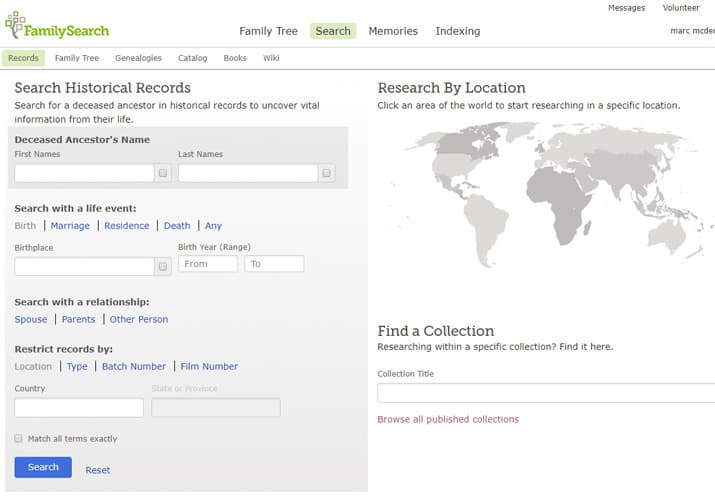
National Archives
The U.S. National Archives provides numerous genealogy records, though most are not available online. Their website helps users locate and learn about available records. Identified records can be accessed by ordering microfilm copies or visiting a regional National Archives research room.
Access options: Order microfilm copies, visit regional research rooms.
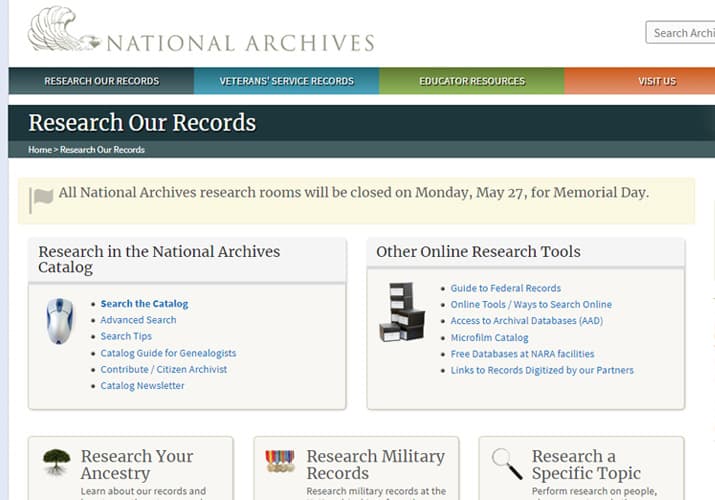
Library of Congress
The Library of Congress website provides access to digitized materials, including 19th- and 20th-century newspapers, books, films, maps, personal narratives from the Veterans History Project, and a wide range of photos, prints, and drawings. Use the library catalogs for archival finding aids and search tools to explore available resources.
Available collections: Newspapers, books, maps, personal narratives, photos, prints, and drawings.

Chronicling America
Chronicling America, part of the Library of Congress website, offers searchable images of U.S. newspapers from 1792 to 1963. Users can search by state, newspaper title, keywords, or date. A valuable feature is the newspaper directory, which shows where newspapers were published and where their archives can be accessed.
Key features: Searchable newspaper images, advanced search by location, keyword, or date, and a comprehensive newspaper directory.
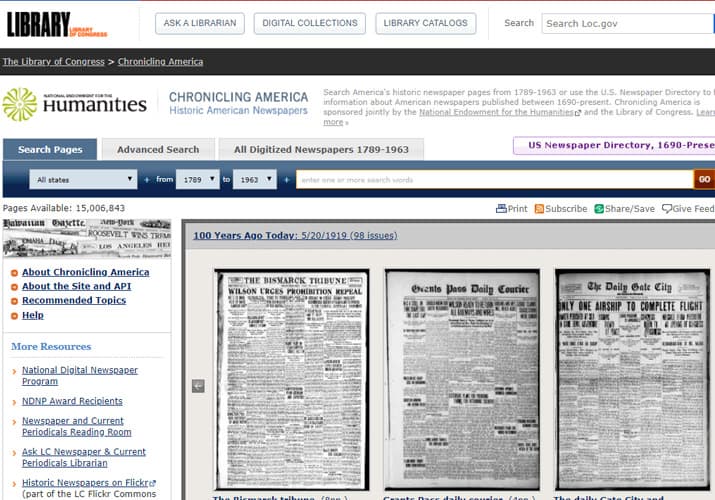
Allen County Public Library
The Allen County Public Library in Fort Wayne, Indiana, boasts one of the largest genealogy collections in the U.S. Their website offers resources for starting family history research, a free searchable database, links to digitized books, and a catalog to locate items available at the library.
Online resources: Searchable database, digitized books, beginner research guides, and catalog search.
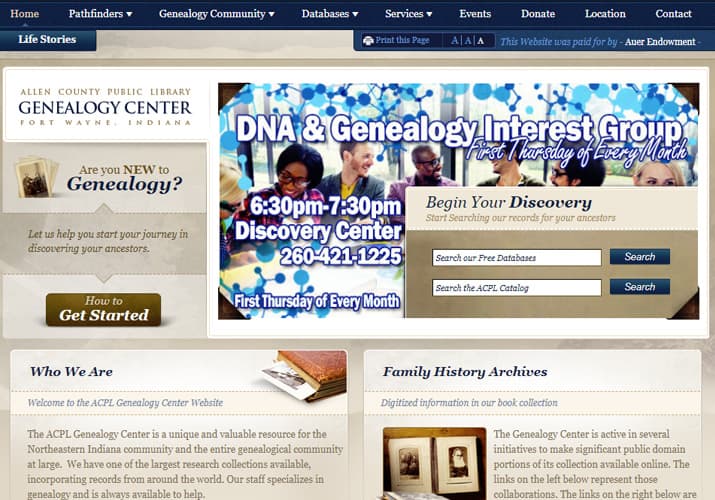
Find a Grave
Find A Grave is a popular free genealogy website with over 170 million burial records. Besides birth, death, and burial details, many records provide information on spouses, parents, and children, with some including obituaries or biographical notes.
Key features: Extensive burial records, family linkages, and occasional biographical details.
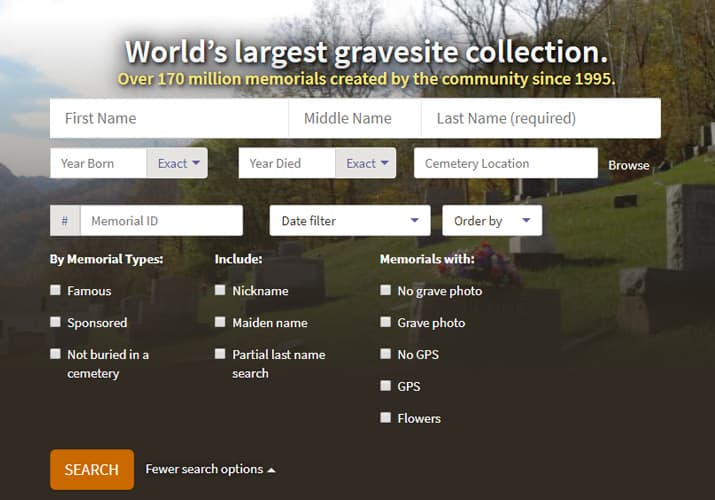
The Statue of Liberty- Ellis Island Foundation
The Ellis Island website provides access to passenger lists, particularly valuable for researching immigrants who entered the U.S. through Ellis Island from the 1890s to the 1920s. The site offers genealogy tips, historical context, and a searchable database of 65 million records, now including Castle Garden entries.
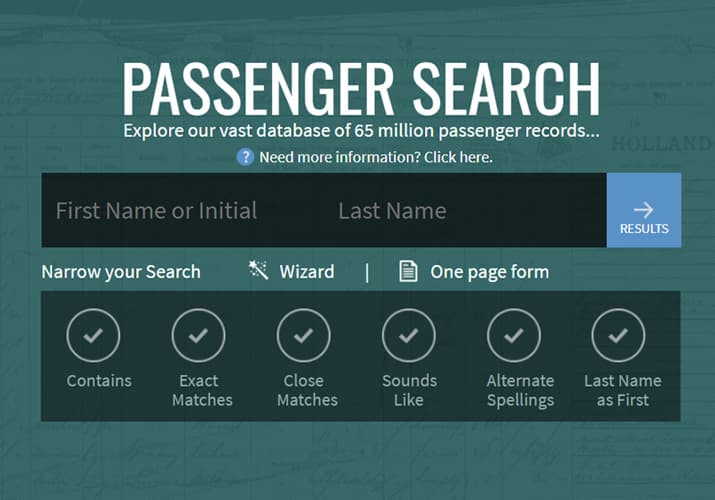
USGenWeb
USGenWeb is a volunteer-maintained resource offering free county and state-level genealogy information. It includes historical details, local cemetery records, birth and death records, obituaries, and links to additional area-specific genealogy resources.
Key features: County and state historical data, cemetery and vital records, and genealogy resource links.
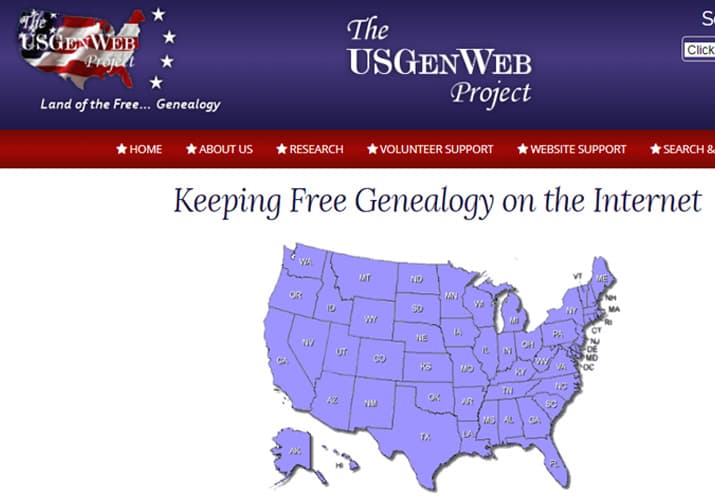
Fulton History
Fulton History is a searchable archive of U.S. and Canadian newspapers from 1795 to 2007, updated weekly with new content. The site allows users to browse digitized document folders or search specific terms on its search page.
Key features: Extensive newspaper archive, historical photos, searchable by keywords and phrases.
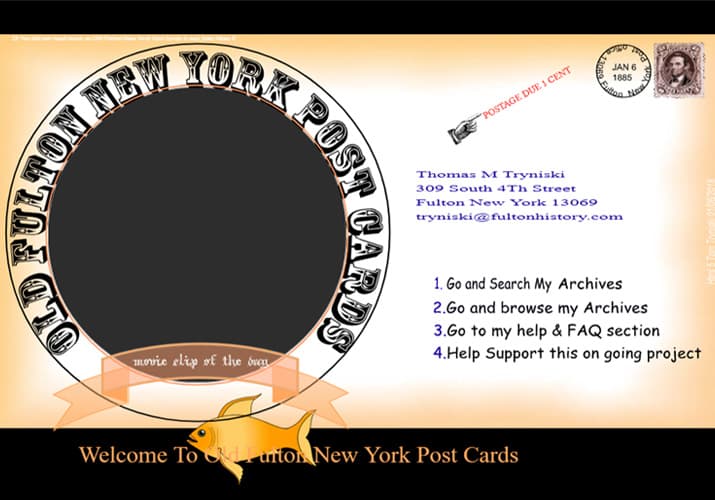
MyHeritage Family Tree Builder Software
This free software gets high ratings in its features, ease of use, and customer support. You can download and use the program for free. This software provides you a template for building a family tree and lets you sync the tree with your MyHeritage online tree.
You can publish charts, view maps, and get hints using this software. Advanced features are available for purchase, but the basic software is useable without the upgrades. See our guide to genealogy software.
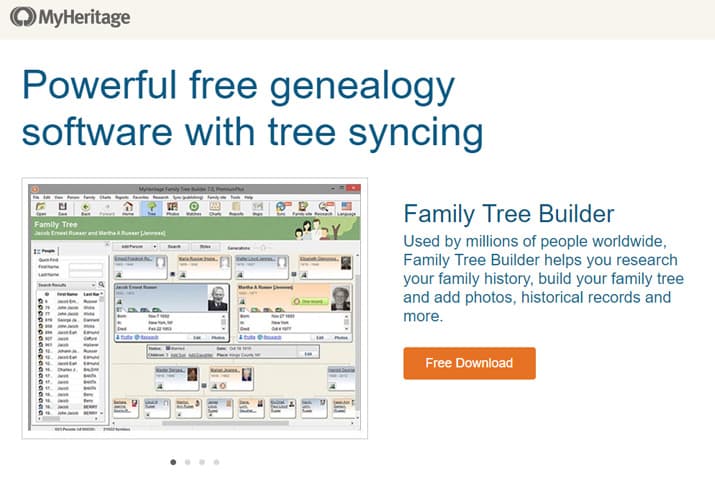
David Rumsey’s Historical Maps
David Rumsey’s Historical Maps offers over 90,000 maps and images, dating from 1223 to today, to help users explore ancestral locations and historical changes in geography. The collection is searchable and browsable by category, including time period, place, and contributor, with options like timeline maps and aerial photos.
Key features: Maps spanning centuries, timeline and aerial views, and advanced search and browse functions.
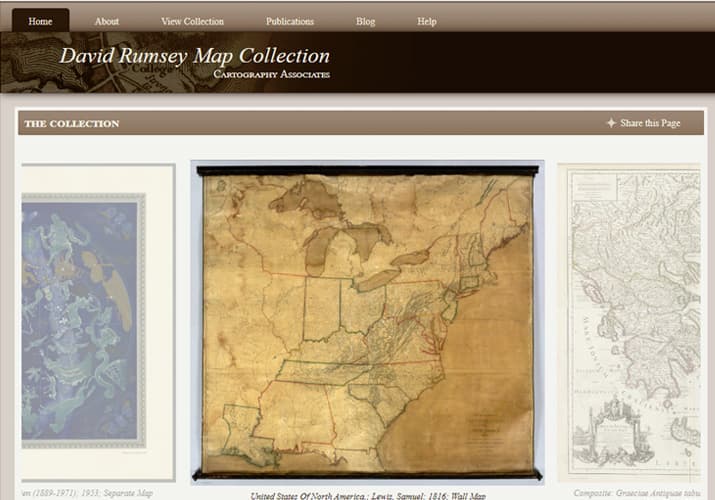
Sanborn Maps
The Sanborn Maps, part of the Library of Congress collection, include over 25,000 fire insurance maps from more than 3,000 U.S. cities. These maps detail city development, building types, residential and commercial areas, and key buildings’ purposes.
Key features: Historical city layouts, building construction types, residential vs. commercial areas, and notable buildings.
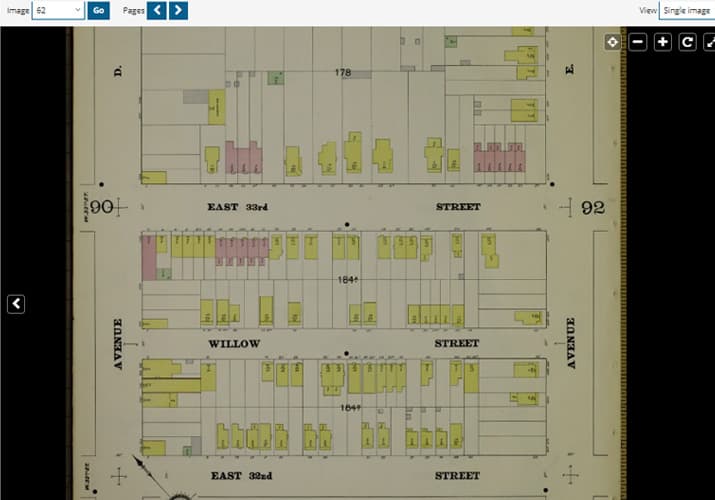
Google Maps
Google Maps is a tool for modern geographical research, providing location search, distance measurement, and topographical or satellite views. For genealogy travel, it offers navigation to find local businesses, cemeteries, museums, and libraries. Users can sign in to create custom maps with pinned points of interest.
Key features: Distance calculation, navigation, satellite and topographical views, and personalized maps.

Free BMD
Free BMD is a valuable resource for those with ancestors from England or Wales, providing transcriptions of the UK Civil Registration Indexes from 1837 to 1992. The project currently offers over 270 million records online, with ongoing transcription efforts.
- Features: Searchable birth, marriage, and death indexes with references for ordering certificates, and links to original index views when available.
- Additional resources: Certificate ordering links and guidance on further research in parish registers on sites like FindmyPast, Ancestry, and FamilySearch.
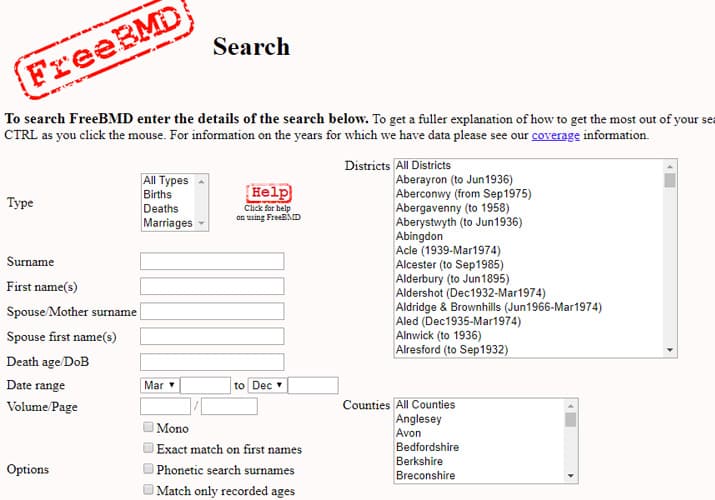
Google Books
Google Books is a valuable resource for genealogy, offering access to scanned books that include family genealogies, local histories, and biographies. Many out-of-print books are available for free reading, and users can gain insights into ancestors and historical context that birth or death records might lack.
Features: Free access to out-of-print genealogies and history books, links to booksellers, and library locator for newer books.
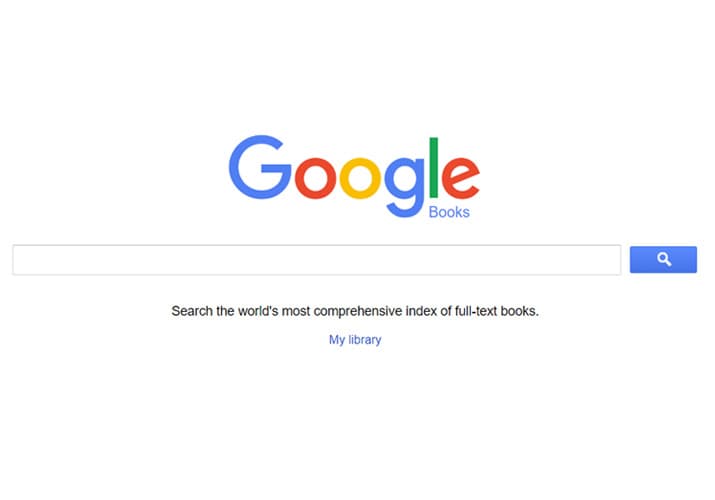
Internet Archive
Internet Archive is a non-profit digital library offering free access to a wide range of materials, including family genealogy books, local histories, school yearbooks, and government documents. Books can be read freely or borrowed online for up to two weeks.
Features: Free or borrowable genealogy books, local histories, yearbooks, and government records.
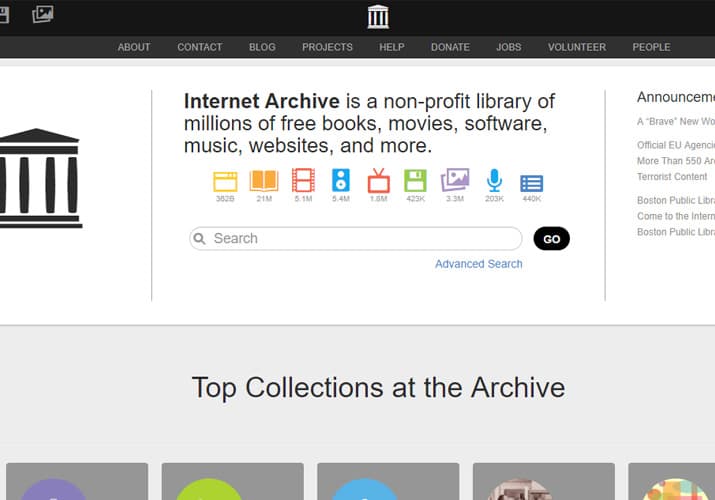
Reclaim the Records
Reclaim the Records is an activist organization working to make public-domain records freely accessible. The group files Freedom of Information (FOI) requests—and, if needed, takes legal action—to obtain records that have been restricted by government agencies, archives, or libraries. All acquired records are digitized, made available online, and free to access.
Key features: Public-domain records released through FOI requests, free digitized records, downloadable access.
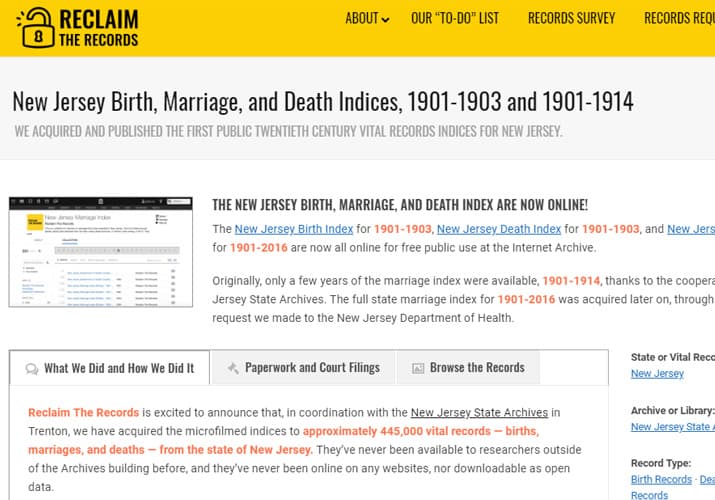
JewishGen
JewishGen is a valuable resource for tracing Jewish ancestry, offering over 20 million records globally. The site includes a beginner’s guide, an online genealogy course, discussion groups, and family finder registration to connect people researching similar family histories.
Databases available: Jewish family trees, community records, burial registries, Holocaust data, and various country-specific records, including birth, marriage, death, military, and census data.
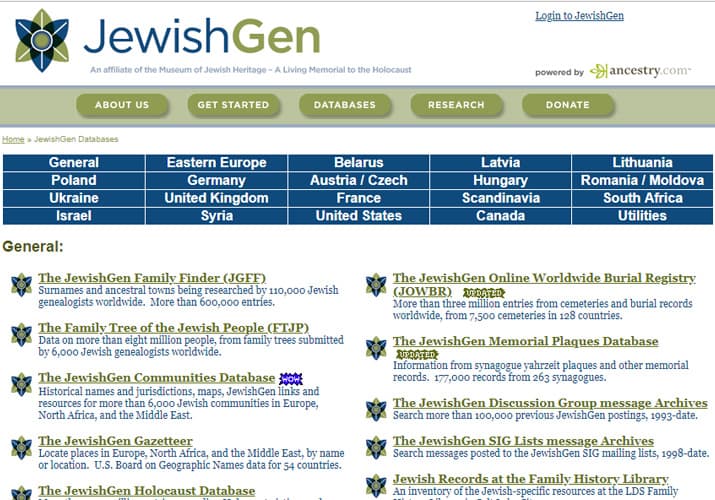
AfriGeneas
AfriGeneas is a genealogy resource focused on African American ancestry, providing an interactive beginner’s guide, searchable records, forums, chats, and links to external resources. The site uniquely gathers slave data from slaveholders’ descendants to assist African Americans in overcoming historical record gaps, especially before the Civil War.
Key features: Beginner guides, searchable records, community forums, and unique slave data collections.
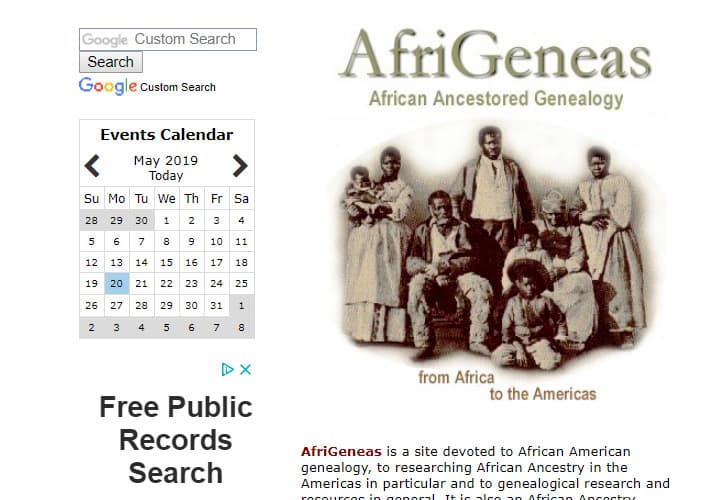
Dead Fred
Dead Fred is a free genealogy photo archive where users can search for ancestor photos and share photographs for others to discover. If you prove direct descent, Dead Fred may send you the original photo if it’s in their archive; only postage is required.
- Key features: Searchable ancestor photos, community photo sharing, free original photos for direct descendants (pay postage only).
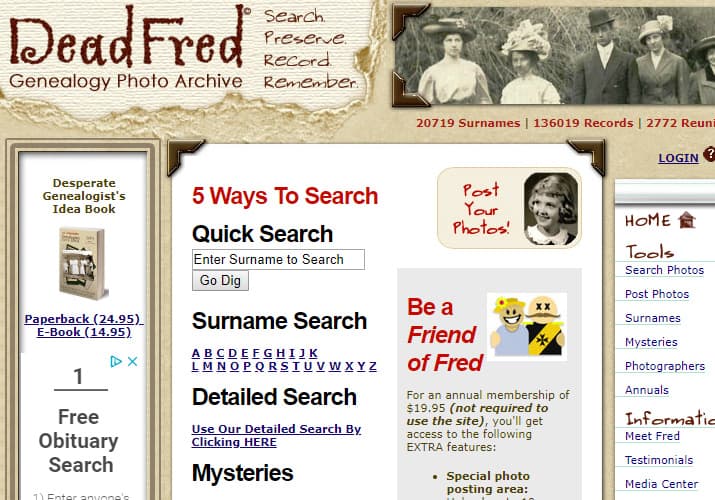
Cyndi’s List
Cyndi’s List is a comprehensive directory for genealogy resources, guiding users to websites where records and information can be found, many of which are free. The site categorizes and cross-references links by location and topic, making it an excellent starting point for genealogical research.
Key features: Directory of genealogy resources, categorized by location and topic, many free resources.
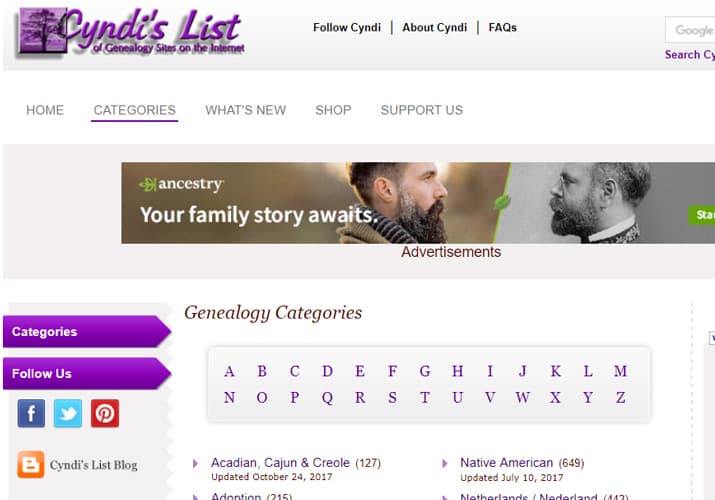
DAR
The Daughters of the American Revolution (DAR) website provides genealogy resources, including a Genealogical Research System (GRS) to search for relatives, ancestors, members, or descendants connected to the organization. The search results offer basic record details and options to purchase full records.
Key features: Family tree resources, GRS searchable database, access to basic record information with links for record purchases.
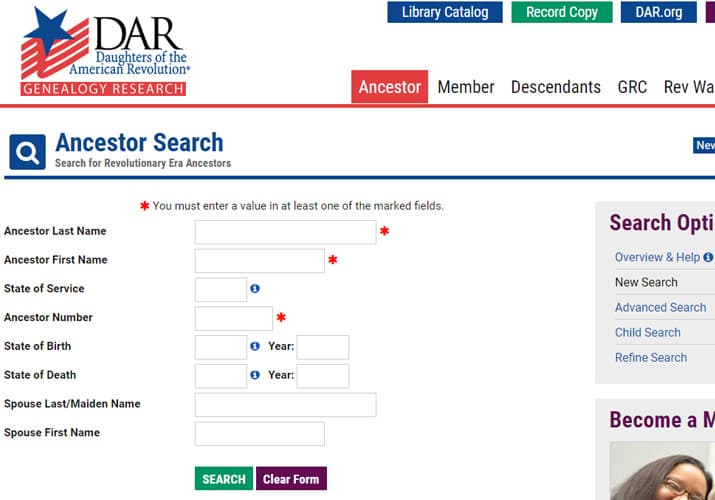
New York Public Library
The New York Public Library (NYPL) has digitized a vast collection of photographic and visual materials, documenting New York City’s evolution from the 1870s to the 1970s. The collection includes over 34,000 images of neighborhoods, architecture, and street scenes. Beyond photos, the NYPL offers digitized atlases, guidebooks, directories, and genealogical records for in-depth historical research on New York City and the broader United States in the 19th and early 20th centuries.
Key features: Digitized NYC photography and visual archives, atlases, guidebooks, directories, and U.S. historical materials from the 19th–20th centuries.
Freedmen’s Bureau
The Freedmen’s Bureau, founded in 1865, assisted newly freed individuals and supported Southern reconstruction. The Freedmen’s Bureau Search Portal provides an extensive, searchable collection of records across various datasets, aiding family historians and researchers in exploring topics related to slavery, Reconstruction, and the journey from enslavement to citizenship.
Key features: Searchable database for names, places, dates, topics, and subjects related to the Freedmen’s Bureau records.
FAQ
What is the best free genealogy website?
The best genealogy website will depend on what you’re researching in terms of time and place. The biggest free site by far though is FamilySearch.org.
Is FamilySearch a free site?
Yes, FamilySearch is completely free to use and tops my list of free genealogy websites. It is owned by the Church of Jesus Christ and Latter-Day Saints. Note that some record collections have special licensing terms that require you to view the collection at a local Family History Center or affiliate library.
Can you view census records for free?
Yes, U.S. census records can be viewed for free on FamilySearch.org.
Are there any free genealogy websites like Ancestry?
The only free website like Ancestry for research and record access is FamilySearch.
What is the most accurate genealogy website?
The most accurate genealogy website depends on what you’re looking for. No one website is the best for every situation. It is important to use multiple sources to get the most accurate information possible.
What is the best subscription-based genealogy website?
While there are numerous free genealogy websites available, several subscription-based platforms offer more comprehensive resources and advanced features. Some of the top subscription-based genealogy websites include Ancestry.com, MyHeritage, and FindMyPast. For a detailed comparison of these and other top genealogy websites, you can refer to our comprehensive guide on the best genealogy websites.
Final thoughts
These genealogy websites offer a wealth of information and tools for individuals interested in researching and documenting their family history. With a little bit of time and effort, you can use these websites to uncover the rich history of your family.

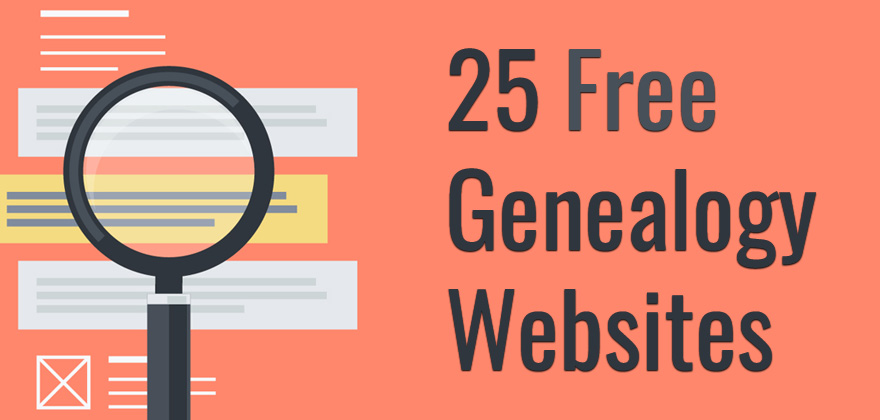
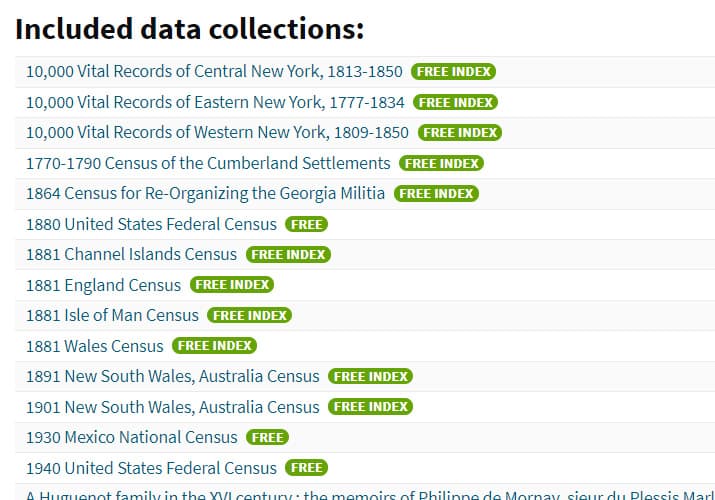
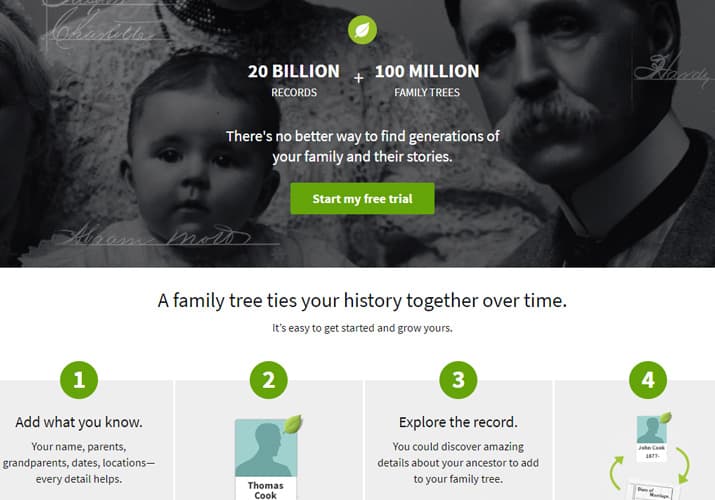

I like hathitrust for books. I often find books there that aren’t on google or internet archive.
I love Chronicling America! Not only can you find news articles, but you can use it to find a publisher of a newspaper for your source, without having to search through entire newspapers trying to find that one line that names the publisher.
Very informative,& interesting
Hi, will some of these free sites do research in Mexico? I am trying to find my mother’s birth certificate.
Hey Mary. Yes but it depends when/where in Mexico she was born. I would start with the FamilySearch wiki to see what’s available.
Awesome information. I use Family Search and WikiTree, each works a bit differently than the other but are effective. Internet Archives, NARA, I use them for ideas but I’ll be more in depth there as well. Really excellent sites. Now if someone could please refile, organize and index my materials?
Thank you for the list. I have taken note of the Congress Library in particular the Chronicling America for newspapers and tomorrow will look at the Sanborn Map Link.